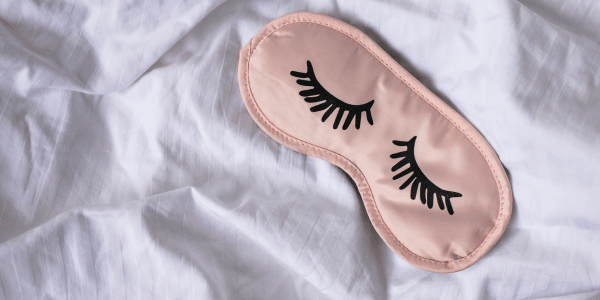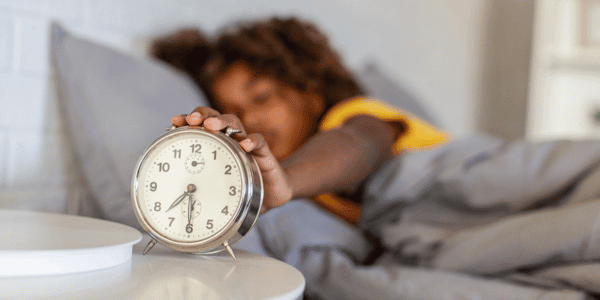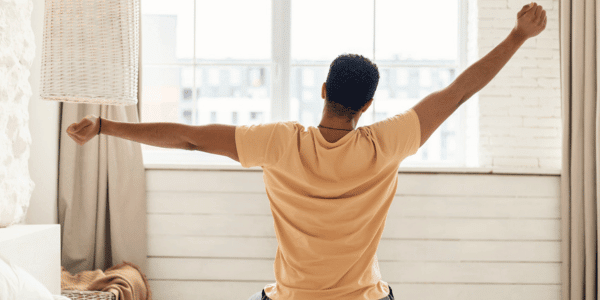Common Myths About Sleep, Debunked

Why is it so hard to get a good night’s sleep? It’s a question we’ve probably all asked that doesn’t have a single answer. The Centers for Disease Control and Prevention (CDC) notes that one in three adults in the United States doesn’t get enough sleep. The reasons why can depend on several factors.
With all the sleep misconceptions and misinformation, it’s easy to get wrapped up in ideas that are a complete yawn. Can’t sleep? We’re putting some of the most common sleep myths to bed and offering trusted remedies to help you learn how to sleep better at night.
Common Sleep Myth #1: Watching a relaxing show before bed helps you unwind.
Whether you’re watching a meditation video or cozying up to a peacefully narrated nature show, all electronics with screens—TVs, tablets, and smartphones—emit blue light. Too much exposure to blue light (especially during the evening) can prevent your body from producing melatonin. As a result, you might struggle to fall asleep due to when you watch a show, not what you watch. Instead, implement a healthy sleep habit and turn off your electronics at least 30 minutes before bed and wind down with a soothing, tech-free ritual.
Common Sleep Myth #2: If you can’t fall asleep, stay in bed and keep trying.
Experts agree: if you can’t fall asleep after 30 minutes of tossing and turning, get up and do something. Even though it might seem counterintuitive, sleep science says to leave your bed, avoid blue light, do a calming activity, and return to bed when you’re tired. That way, your body better associates your bed with sleep. A National Institute of Health study found that people who got out of bed had enhanced sleep quality and an easier time falling asleep.
Common Sleep Myth #3: Having a nightcap can lull your body into a good night’s rest.
People often ask: does alcohol help you sleep? Many believe that having a glass of beer, wine, liquor, or another type of alcohol encourages satisfactory sleep; however, this is a common sleep myth—the opposite is true. While an alcoholic beverage may help you fall asleep, it’ll disrupt your sleep later. Alcohol consumption delays rapid eye movement (REM) sleep and worsens sleep apnea symptoms, such as loud snoring, breathing pauses, and an increased need for bathroom breaks. For adequate sleep, abstain from drinking at least three hours before bed.
Common Sleep Myth #4: A late afternoon coffee break doesn’t interrupt sleep.
We all like a pick-me-up, but it can take our bodies hours to fully metabolize caffeine, keeping you wired if enjoyed later in the day. For optimal sleep health, it’s best to stay away from caffeine after noon to make sure the buzz is gone before bedtime.

Common Sleep Myth #5: Exercising within four hours of bedtime will mess up your zzz’s.
Exercising does a lot for your well-being, sending healthy vibes to your brain and body while you’re awake and asleep. Everyone is unique, but it usually isn’t inherently bad to get a moderate sweat in an hour or two before heading to bed. Exercise can clear your mind, which relieves the stress and anxiety that can interfere with sleep. It also uses your stored energy, so you feel tired earlier and sleep longer.
RELATED: At-Home Fitness: Seven Simple Exercises to Do Around the House
Common Sleep Myth #6: Napping helps you catch up on sleep.
Napping has some perks and can boost your mood, memory, and alertness, but you might want to lay off the daytime snooze to promote great nighttime sleep. Don’t nap late in the day, and keep your naps to no more than 30 minutes. Your mind and body should have ample time to rest without entering a deeper stage of sleep. Extended naps disturb sleep patterns, leading to sleeplessness and restlessness.
Common Sleep Myth #7: Everyone needs eight hours of sleep.
Is 8 hours of sleep necessary? Well, the amount of sleep one needs varies from person to person. Researchers with the National Sleep Foundation determined that every age group requires different hours of sleep. Here’s how much sleep you really need:
- 14-17 hours for newborns
- 12-15 hours for infants
- 11-14 hours for toddlers
- 10-13 hours for preschoolers
- 9-11 hours for school-aged children
- 8-10 hours for teenagers
- 7-9 hours for young adults and adults
- 7-8 hours for older adults
Consistently getting too much or too little sleep can negatively impact your brain, emotions, immune system, and overall health.
Common Sleep Myth #8: Your body will learn how to function with less sleep.
Very few people can function with less than the recommended amount of sleep. It’s a common myth about sleep that five hours is enough sleep—it’s not. When sleep is restricted, you’re sleepy throughout the day. Your performance suffers, and you’re more at risk for car- and work-related accidents. Studies also show that those who get less sleep are in poorer health, and over time, it becomes more and more difficult to stay awake, jeopardizing your physical fitness and safety.

Start Your Day Right After Debunking These Common Sleep Myths
Now that we’ve debunked these common sleep myths, it’s clear that you need to always prioritize rest and allow your body the rejuvenation it needs. When you have healthy sleep habits, you’ll not only have extra energy but also experience a significant improvement in your daily tasks. Give yourself the gift of quality sleep health and wake up ready to conquer each day with renewed stamina and focus! Want to make sure your day starts on the right foot? Check out these morning routine ideas.